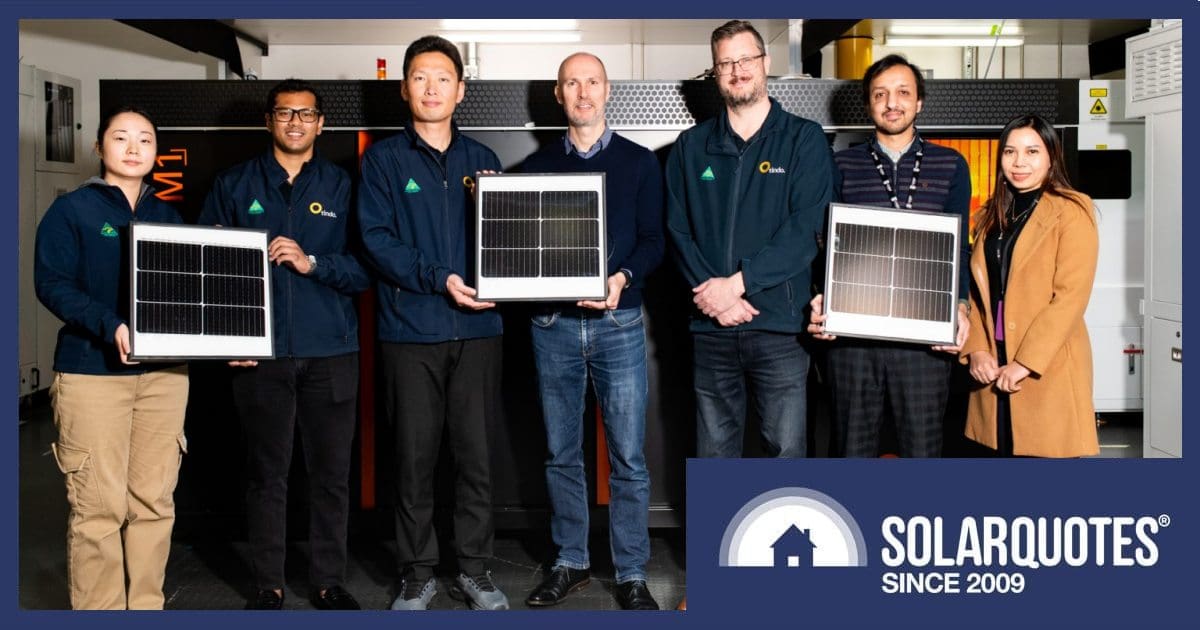
Australia’s only solar panel manufacturer, Tindo, is to explore TOPCon solar cell technology in partnership with the University of New South Wales (UNSW) — where TOPCon was originally developed many years ago.
What Is TOPCon?
TOPCon stands for Tunnel Oxide Passivated Contact. It’s an advanced solar cell design enhancing efficiency by minimizing recombination losses, especially at the rear side of the cell. Among the other advantages of TOPCon is a lower temperature coefficient, meaning it generally performs better in hot conditions — particularly desirable in a country such as Australia.
TOPCon was initially developed in the early 1980s by Professor Martin Green at UNSW, but commercial development only commenced in the 2010s. Professor Green was also behind the development of PERC (Passivated Emitter and Rear Cell) solar technology at UNSW in 1983, which eventually became the dominant technology. PERC and TOPCon tech features in around 90% of all solar panels produced today.
About The Tindo/UNSW Partnership
The research project is being funded by the Trailblazer for Recycling and Clean Energy (TRaCE) program, which among its aims seeks to accelerate the integration and scale of solar technologies in Australian manufacturing. A $280 million joint venture of UNSW and University of Newcastle, TRaCE is supported by the Australian Government.
According to Tindo, TOPCon can achieve around 27% conversion efficiency, while current PERC solar cells cannot achieve more than 25%. TOPCon technology is already being widely used by solar panel manufacturers and is still evolving, but some concerns persist in relation to long-term performance, such as the potential for water ingress and degradation rates under damp-heat conditions.
PERC has been the tech of choice for Tindo to this point and despite others embracing TOPCon, adopting it isn’t something the firm is taking lightly.
“TOPCon presents an exciting leap in efficiency,” said Professor Bram Hoex, who is heading the UNSW research team. “But to ensure its long-term success, we have to understand its unique features, including its sensitivities to the various environmental stresses.”
Tindo CEO Richard Petterson says the partnership will optimise TOPCon technology.
“Tindo has its own in-house design and engineering innovation function, but we also partner with high-level research organisations such as UNSW – it’s the blend of industry and research that will develop the next generations of solar technology.”
But while TOPCon has been taking over from PERC, another technology has emerged as a serious challenger — Interdigitated Back Contact (IBC), aka All Back Contact (ABC) silicon solar cells. This technology involves having all electrical contacts on the rear side of solar cell.
Again illustrating how long it can take from a eureka moment to market, IBC was initially developed in the late 1970s. SunPower (Maxeon) was the first company to commercially manufacture IBC solar panels in 2004, but it’s only relatively recently other manufacturers have joined in. While the tech didn’t originate in Australia, there is also more research occurring on IBC/ABC at UNSW through the university’s collaboration with China’s Aiko.
Tindo Kicking Goals
In other recent news from Tindo, in late June the firm announced it had been chosen as the solar PV supplier to Queensland’s Bowen Water Pipeline project. The project will use 52,174 Tindo 575W Walara solar panels, for a total capacity of 30 MW. Tindo’s Walara panels were launched in 2024, initially for the home solar market.
Another big score for the company was also last month, when it signed a five-year $8.4 million deal to export 15MW of its solar panels to Vietnam; quite an achievement given Vietnam’s significant existing local module manufacturing capacity.
Tindo started manufacturing panels using imported cells in 2011 and opened its new factory in Adelaide in 2021 that now boasts 60 employees. If you’re looking for commercially available Australian-made solar panels, Tindo is still the only show in town — although pricier than popular good-quality Chinese brands.
Australians who have been happy to part with the extra bucks also seem generally happy with their purchase. Tindo Solar panel reviews on SolarQuotes have averaged 4.7 stars based on 129 ratings.

 RSS - Posts
RSS - Posts



Speak Your Mind